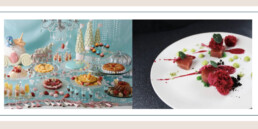
I'm excited to take you on a journey about trust today. In addition, you find my current thoughts on the topic of luxury, developed in preparation for a keynote in Hanover this week. Have fun diving in.
A higher good: trust.
An ordinary Monday morning: I'm going through my emails and stumble across the automatically generated LinkedIn job recommendations that have suddenly raised my interest. Not because I'm looking for a job, but rather because the jobs posted remind me of Black Mirror – a Netflix series that depicts future scenarios, sometimes very dramatically.
The job titles I see are completely new to me – “Culture and Well-being Manager”, “Community and Relations Specialist”, and “Head of Customer Engagement” – and I was curious to read up on their meaning and function. They seem to point to a new attempt to focus on people, i.e. employees and customers. What’s exciting here is that the job offers didn’t come from major tech companies like Google or Apple, players where one expects the employee will play a central role. No, I'm talking about long-established corporations, international consultancies and SMEs (small and mid-sized companies). What’s happening? Are turnover rates out of control? Have people realized how essential employees are for the success of a company, or how difficult it is to find new ones?
The current job market is a reaction to what has become apparent in companies, especially during the pandemic. Relationships need focus and ongoing care. If your husband/wife received a newsletter once a year with the latest update, your relationship would probably be somewhere else today. Attention, personal words – something real: that’s what people (including employees and customers) are looking for. As we can learn from partnerships, building and maintaining a relationship is an ongoing process, it cannot be achieved by making a few isolated gestures.
Two years of pandemic have left their mark. During this time, we all not only hoped that normal would return, but also questioned our “normal”. Any (customer or employee) relationships that were not strong enough broke down because of this very questioning. The task these new managers now have is an almost impossible discipline as they battle fundamental doubts about existing concepts. Culture managers and customer engagement managers are being asked to rebuild trust where it has been lost, or never existed. Regaining trust or laying the foundation for it – something else we know from personal experience – is a process that takes time.
A Management Matter
Loyalty, self-responsibility, active thinking and thus creating added value for the company all form the basis of an entrepreneur’s trust in his employees. A culture manager alone cannot achieve this; it must be viewed more holistically. The necessary framework can only come from the entrepreneur or CEO himself. The well-intentioned new hires need clarity about the entrepreneur's attitude in order to function. A clear attitude is one that describes the entrepreneurial spirit in its depth, it is the unconscious feeling that guides an entrepreneur, and this is precisely what needs to be put into words.
With this in mind, the idea for Zero Senses was born four years ago. We work with entrepreneurs and leaders to verbalize their attitude and accompany them in creating ways and structures to express this approach. How can intuitive entrepreneurship be verbalized and thus shared with partners, customers and employees? This will be the basic prerequisite for the aforementioned new hires.
It is obvious that the entrepreneurial attitude cannot be identified overnight and implemented internally. Short-term solutions don’t work – this is about depth. Style cannot be developed overnight. A stylish home doesn’t look like something in a furniture catalog. Pieces of furniture need history and not just the same purchase date. Style is developed over time, just like a clear attitude.
What has inspired me recently? Exaggeration.
People like to talk about material and immaterial luxury. The former is understood as loud status luxury, which immediately triggers images of fast cars, luxury yachts and other consumer goods outside the normal standard of living. This luxury is clearly associated with exaggeration. The quiet - immaterial - luxury, on the other hand, is associated with tranquility, self-determination and reduction. One might think is the very opposite of luxury. However, in extreme cases, exaggeration can also be found in this type of luxury, such as when a multimillionaire “brags” about being such a minimalist as to possess only 64 things, or the essence of a lavishly laid dessert buffet is suddenly found in foams and essences in the dessert bowl of a Michelin-starred restaurant. That being said, we also find exaggerations in immaterial luxury, namely in that of compulsive minimalism. For me, this results in a new definition: luxury means exaggeration (in whatever form). And exactly this triggered my thoughts for a new form of luxury. To be continued.


Share

